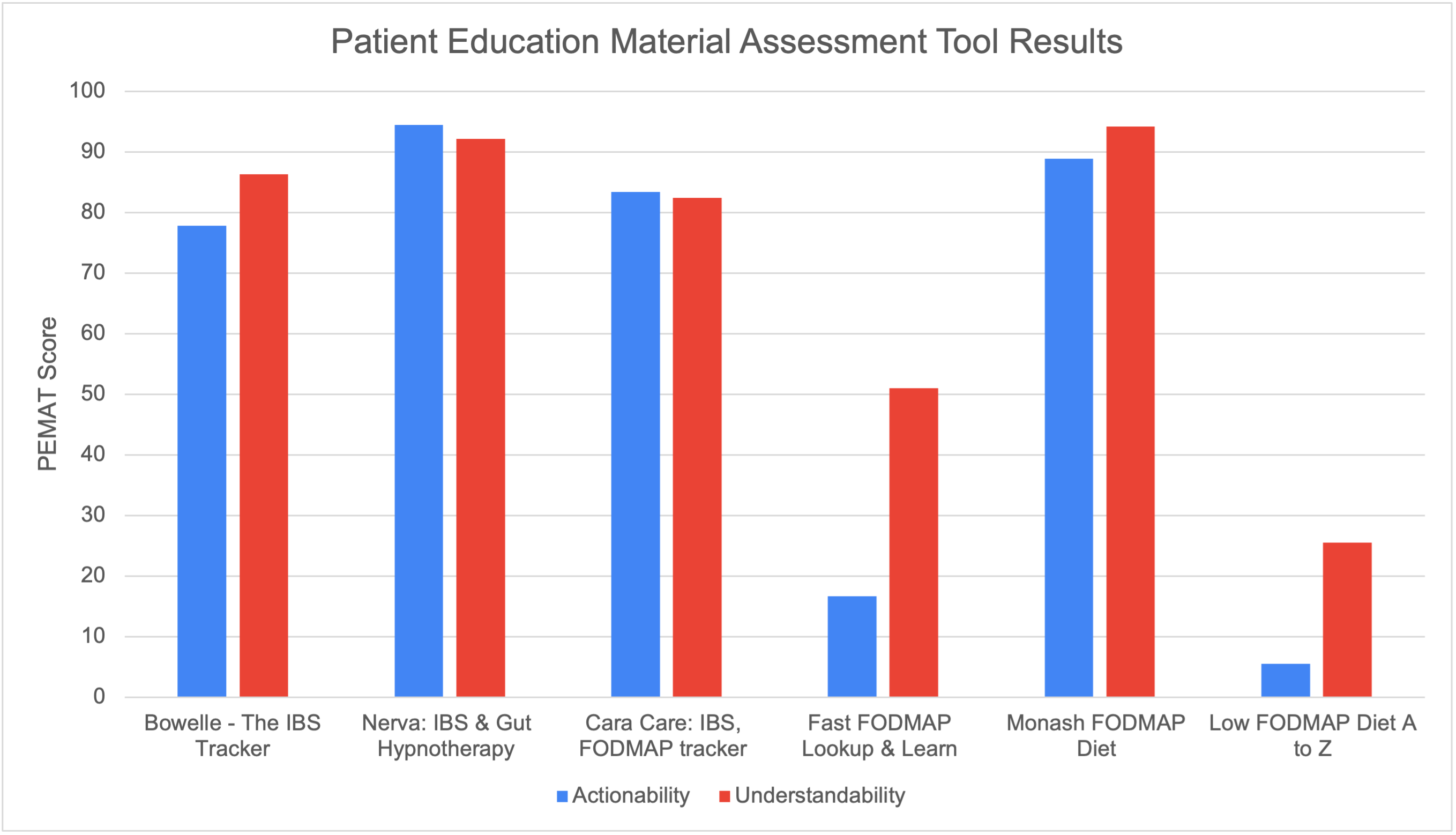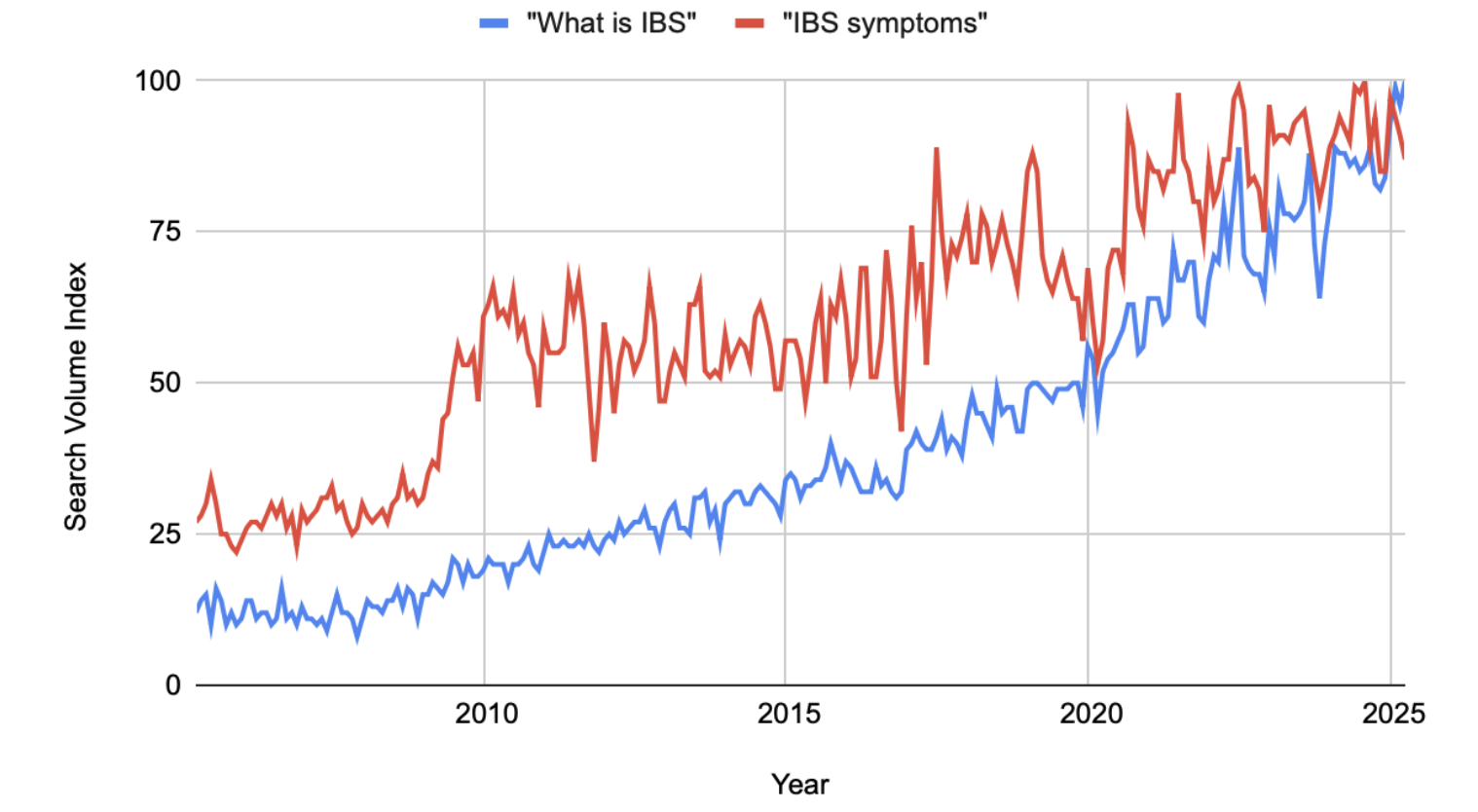Sunday Poster Session
Category: Functional Bowel Disease
P0782 - Evaluating the Quality and Reach of Digital Health Tools for IBS: A Cross-Sectional Analysis
Sunday, October 26, 2025
3:30 PM - 7:00 PM PDT
Location: Exhibit Hall

Abby Kunitsky, DO
McLaren Macomb
Mt. Clemens, MI
Presenting Author(s)
Abby Kunitsky, DO1, Cole Bernstein, 2, Julia Janecki, DO, MSPH3, Mark C. Wang, MD4, Samuel Gun, DO1
1McLaren Macomb, Mt. Clemens, MI; 2Kansas City University, Kansas City, MO; 3McLaren Macomb, Royal Oak, MI; 4Keck School of Medicine of the University of Southern California, Los Angeles, CA
Introduction: Irritable bowel syndrome (IBS) affects 10–15% of the global population, presenting major challenges to quality of life and healthcare systems. As digital health tools rise in popularity, patients are increasingly turning to smartphone apps and social media for IBS-related information. However, concerns about the accuracy and reliability of these resources underscore the need for careful evaluation.
Methods: Google Trends data from 2005 to 2025 was analyzed to assess trends in IBS-related searches. A survey distributed via several Facebook and Reddit groups evaluated patient preferences for IBS information sources and app usage. The top six IBS smartphone apps were selected for a cross-sectional analysis based on download metrics and relevance. The 'information-quality' subscale of the Mobile Application Rating Scale (MARS) was used to assess the overall quality of information published in these apps, while the Patient Education Materials Assessment Tool (PEMAT) evaluated understandability and actionability. Three independent evaluators conducted assessments with these tools, and statistical analyses were performed using Microsoft Excel.
Results: Google Trends showed a steady rise in interest in IBS definitions and symptoms over two decades (Figure 1). Survey results indicated that Reddit and TikTok were the most popular platforms for IBS information. Nearly half of respondents (48.5%) reported using IBS apps, with 65% using them daily. Most apps focused on low FODMAP diet tracking. MARS scores varied widely, averaging only 16.6 out of 35, with physician- or university-developed apps scoring significantly higher. PEMAT results showed overall satisfactory understandability (mean score 73) but low actionability (mean score 61) (Figure 2). Apps from academic or clinical sources consistently outperformed those from commercial developers.
Discussion: Our study underscores the growing patient reliance on digital health tools for learning about IBS and managing symptoms. However, the quality and consistency of information provided by smartphone apps remain variable and often insufficient. Increased physician and university involvement would help improve IBS apps, ensuring that patients receive accurate, reliable, and actionable information through these digital platforms. Clinicians should be aware of the digital resources their patients are using and consider formal recommendations or at least integrate discussions about app use into routine IBS management to enhance education and engagement.

Figure: Figure 1: Google Trends Search Volume Index score for the “What is IBS” and “IBS symptoms”
search terms from January 2005 to January 2025.

Figure: Figure 2: The mean PEMAT score demonstrating actionability and understandability of IBS-related apps.
Disclosures:
Abby Kunitsky indicated no relevant financial relationships.
Cole Bernstein indicated no relevant financial relationships.
Julia Janecki indicated no relevant financial relationships.
Mark Wang indicated no relevant financial relationships.
Samuel Gun indicated no relevant financial relationships.
Abby Kunitsky, DO1, Cole Bernstein, 2, Julia Janecki, DO, MSPH3, Mark C. Wang, MD4, Samuel Gun, DO1. P0782 - Evaluating the Quality and Reach of Digital Health Tools for IBS: A Cross-Sectional Analysis, ACG 2025 Annual Scientific Meeting Abstracts. Phoenix, AZ: American College of Gastroenterology.
1McLaren Macomb, Mt. Clemens, MI; 2Kansas City University, Kansas City, MO; 3McLaren Macomb, Royal Oak, MI; 4Keck School of Medicine of the University of Southern California, Los Angeles, CA
Introduction: Irritable bowel syndrome (IBS) affects 10–15% of the global population, presenting major challenges to quality of life and healthcare systems. As digital health tools rise in popularity, patients are increasingly turning to smartphone apps and social media for IBS-related information. However, concerns about the accuracy and reliability of these resources underscore the need for careful evaluation.
Methods: Google Trends data from 2005 to 2025 was analyzed to assess trends in IBS-related searches. A survey distributed via several Facebook and Reddit groups evaluated patient preferences for IBS information sources and app usage. The top six IBS smartphone apps were selected for a cross-sectional analysis based on download metrics and relevance. The 'information-quality' subscale of the Mobile Application Rating Scale (MARS) was used to assess the overall quality of information published in these apps, while the Patient Education Materials Assessment Tool (PEMAT) evaluated understandability and actionability. Three independent evaluators conducted assessments with these tools, and statistical analyses were performed using Microsoft Excel.
Results: Google Trends showed a steady rise in interest in IBS definitions and symptoms over two decades (Figure 1). Survey results indicated that Reddit and TikTok were the most popular platforms for IBS information. Nearly half of respondents (48.5%) reported using IBS apps, with 65% using them daily. Most apps focused on low FODMAP diet tracking. MARS scores varied widely, averaging only 16.6 out of 35, with physician- or university-developed apps scoring significantly higher. PEMAT results showed overall satisfactory understandability (mean score 73) but low actionability (mean score 61) (Figure 2). Apps from academic or clinical sources consistently outperformed those from commercial developers.
Discussion: Our study underscores the growing patient reliance on digital health tools for learning about IBS and managing symptoms. However, the quality and consistency of information provided by smartphone apps remain variable and often insufficient. Increased physician and university involvement would help improve IBS apps, ensuring that patients receive accurate, reliable, and actionable information through these digital platforms. Clinicians should be aware of the digital resources their patients are using and consider formal recommendations or at least integrate discussions about app use into routine IBS management to enhance education and engagement.

Figure: Figure 1: Google Trends Search Volume Index score for the “What is IBS” and “IBS symptoms”
search terms from January 2005 to January 2025.

Figure: Figure 2: The mean PEMAT score demonstrating actionability and understandability of IBS-related apps.
Disclosures:
Abby Kunitsky indicated no relevant financial relationships.
Cole Bernstein indicated no relevant financial relationships.
Julia Janecki indicated no relevant financial relationships.
Mark Wang indicated no relevant financial relationships.
Samuel Gun indicated no relevant financial relationships.
Abby Kunitsky, DO1, Cole Bernstein, 2, Julia Janecki, DO, MSPH3, Mark C. Wang, MD4, Samuel Gun, DO1. P0782 - Evaluating the Quality and Reach of Digital Health Tools for IBS: A Cross-Sectional Analysis, ACG 2025 Annual Scientific Meeting Abstracts. Phoenix, AZ: American College of Gastroenterology.
